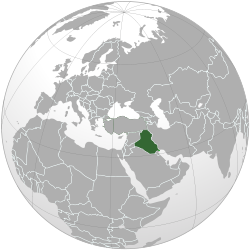Preparing For A Sunni Arab Spring In Baghdad – Analysis
Moves by an Iraqi Sunni-dominated province to demand autonomy from Baghdad and rumors of coup d’etat led by Ba’athists have Iraqi Prime Minister Nuri al-Maliki very worried about the prospects of a rebellion.
Such an “Iraqi Spring” would enjoy the full financial and political backing of Saudi Arabia’s new Crown Prince, Nayef Ibn Abdul-Aziz. In recent years Nayef has seen his country’s influence in Iraq drop dramatically as Tehran’s star rose.
The uprising would be very different to the Arab Spring. Instead of a grassroots revolt against an autocratic ruler, this would see Sunnis revolt against the Shi’ite politicians imposed on them since Iran established its hegemony over Iraqi politics in 2003.

Saudi Arabia is determined to attack Iran’s influence once Americans troops leave this December. And as a staunch anti-Shi’ite royal who has an old grudge to settle, Nayef sees Iraq as a perfect battlefront for a confrontation with the Iranians.
It all started with a tip from the new leaders of Libya that ex-Ba’athists and Saddam Hussein loyalists were plotting a coup d’etat. Libya’s interim leader Mahmud Jibril revealed the information to Maliki, dug up from papers of the deceased Colonel Muammar Gaddafi, during a surprise visit to Baghdad in October.
In response to the alleged plot, Maliki later that month ordered the arrest of over 600 Ba’athists – all Sunnis. He also purged former Ba’athists in higher education, firing 145 employees of Salahuddin University in Tikrit, north of Baghdad, Saddam’s hometown and a hotbed of the Sunni insurgency that raged from 2003 to 2008.
Reacting to the arrests and academic purge, the provincial council in Salahuddin on October 27 symbolically declared the province an autonomous region, with local politicians claiming Maliki’s government was dominated by religiously-driven, Iran-backed officials.
Maliki has reacted furiously to Salahuddin’s demands for autonomy, warning it will not become “a safehouse for Ba’athists.” Last week, Maliki also called on members of the disbanded Ba’ath party to publicly renounce it in writing, threatening persecution if they fail to comply. Only then could they be welcomed back into Iraqi society and become eligible for government office, he said.
The mass majority of the Ba’ath party’s members only joined to rise through Iraq’s bureaucracy and military, not out of conviction in its motto of “unity, freedom and socialism”. These people neither took part in Saddam’s crimes nor approved of them.
Maliki’s demand that Ba’athists renounce their party membership was delivered at a speech in Karbala, a stronghold of the Shi’ite community. For ordinary Sunnis, the statement has Iran’s fingerprints all over it and is aimed at nothing but settling old scores.
The premier’s anger does not change the fact that under Article 119 of the constitution, “One or more governorates shall have the right to organize into a region based on a request to be voted on in a referendum.” Meaning, the residents of Salahuddin could achieve autonomy, like Iraqi Kurdistan, if this was achieved through popular referendum.
Iraqi Sunnis will try to do it the official way, but if Maliki prevents them they will take to the streets, just like angry Arabs have done in Cairo, Sana’a and Damascus. Maliki realizes that if the Sunnis take the matter to the polls, they would indeed demand autonomy for Salahuddin and other provinces would quickly follow suit.
The Iraqi prime minister has desperately tried explaining his position by saying that this “is not the moment for federalism”, claiming that if passed, or even raised officially, this would be a “national disaster”.
Had it been up to Iran, it would have declared autonomy for Shi’ites in southern Iraq years ago. The idea originally surfaced in 2005, put forth by Iran’s prime ally in Iraqi politics, the late Abdul Aziz al-Hakim, president of the Supreme Iraqi Islamic Council (SIIC).
Autonomy for Shi’ites in southern Iraq, topped with Kurds in northern Iraq, would have left Sunnis in central Iraq helpless, weak and with no oil. The project never saw the light of day due to a strong veto from Sunnis. Now, it is the Sunnis who are demanding autonomy for the first time since the country was created in the early 1920s.
As well as being fed up with Iranian dictates, the Sunni minority is furious with being treated as an underclass since the toppling of Saddam in 2003.
The uprisings in Tunisia, Egypt, Yemen, Libya and now Syria have undoubtedly awakened a Sunni appetite for change. After demonstrations broke out in different Iraqi cities last February, Maliki said that he would not run for a third term in office next 2014.
That apparently is not enough for Iraq’s Sunni community, which is eager to bring down a sectarian system imposed on them by Maliki and his allies, aided by the Americans. The death of Crown Prince Sultan and his replacement by Nayef seems also a blessing in disguise for Sunnis.
Nothing serious will happen in Iraq, however, until Iraqi advocates of the Arab Spring see the outcome of the protests in Yemen and Syria. The same applied as Syrian activists waited to see its results in Egypt.
Maliki, however, still believes that Iraq is different from Syria, but this could be as mistaken as Gaddafi’s belief that he was different from Hosni Mubarak.
This article appeared in Asia Times on November 14, 2011 entitled “Malki frets over Iraqi Spring.”
